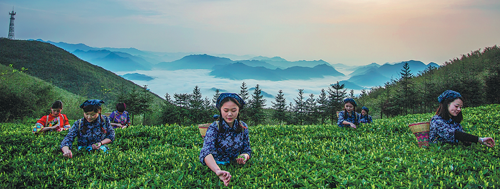28
2022/11
Share
Tea drives Anhua's culture and tourism
Time:
2022-11-28 08:39
Source:
chinadaily
Economy has maintained strong growth and earned honorary titles in Hunan province
As a key tea-producing area in Hunan province, Anhua county in Yiyang city combines tea with tourism and its cultural industry to promote high-quality development and create a wonderful experience for visitors from China and abroad.
"Integrating tea culture into tourism is a unique feature of Anhua," said Shi Luming, Party secretary of the county.
Walking along the green ridges in Anhua, the air is filled with the refreshing fragrance of tea. The county, known as the hometown of dark tea in China, is on the right track to boosting the integrated development of "tea tourism, culture, sports and health" and showing a new look of great changes in mountains, rivers and villages.
In recent years, Anhua's cultural tourism industry has maintained a strong growth trend and won honorary titles such as "Tourism County in Hunan Province", "China's Best Health and Leisure Tourism Resort" and "Hunan Province Global Tourism Creation Demonstration Zone".
Anhua has created a number of tea gardens such as the 4A-level Yuntai Mountain scenic spot and the Flower Sea Ecological Park. It has also built a number of tea-themed homestays including Yuntai Mountain Banshan Yinsu and Tangxi Xianglong Villa as well as tea tourism towns.
The Flower Sea Ecological Park is a demonstration base for the integrated development of dark tea planting and tourism in the region. Flowers are the focus there, together with four seasonal gardens. There are standardized and neat terraced fields, vertical tea gardens with three interlaced colors and artistic tea gardens with pictures and text.
In addition to viewing flowers, visitors can enjoy entertainment projects such as Yingbin Waterfall, Sightseeing Water Tower and Glass Tianhe Rafting.
Prosperous heritage
Anhua is striving to tap into its profound historical and cultural heritage based on its ancient tea culture dating back hundreds of years when merchants rode camels traveling on the bluestone road, today known as Tea-Horse Road. They rode alongside caravans transporting tea sold to other places. The early buildings of the Anhua Dark Tea Factory are important historical and cultural heritage sites that have witnessed the prosperity of the county's tea industry.
Established in 1950, the Anhua Dark Tea Factory had promoted the development of the region's tea industry and witnessed the advancement of the tea-processing machinery.
Dark tea master Feng Shaoqiu, who had been engaged in tea research in Anhua for 14 years, created more than 70 dark tea refining and processing methods, introduced five tea machines from Shanghai, pioneered the mechanization of tea production in Hunan and realized the "manual kneading of tea".
Huang Benhong, another expert in tea science, who was the first director of the Anhua Dark Tea Factory, took the lead in organizing tea cooperatives, created the "four-way tea-making method", carried out tea machinery research and invented iron-wood structure shakers.
Yongxi Bridge, built with bluestone mortar and wooden mortise and tenon structure, has tightened the friendship between the region and other countries since ancient times. The tea ceremony expanded to other places and business transactions were accompanied by ideological and cultural exchanges.
Since 2006, Anhua has adhered to green development, identified tea as a leading industry for enriching its people and strengthening the county.
Anhua's culture-tourism integrated development path is getting smoother. Many talented people return to their hometowns to start businesses, invest in the tea tourism industry and build ecological parks and museums. The vigorous development of Anhua's tea industry has driven the rapid growth of tea art, logistics, packaging and tourism.
Statistics show that more than 350,000 people in the county are currently engaged in tea-related production and business activities. Anhua dark tea has gradually grown into a rich leading industry and become a pillar of rural vitalization in the county.
Anhua has 24,120 hectares of tea gardens and 210 tea processing enterprises. Relying on the local characteristic tea industry, Anhua takes advantage of its beautiful rural environment and fully integrates it with catering, tourism, leisure and entertainment industries. It aims to drive regional economic growth and increase farmers' incomes.
The integrated development of tea and tourism has enriched the tourism industry and led the people of tea villages to start businesses together. During the 14th Five-Year Plan (2021-25), Anhua will comprehensively promote rural vitalization, accelerate the integrated development of tea, tourism, cultural and recreational industries and strive to build industrial clusters. This will create an "Anhua model" of integrated development in China's tea tourism.
Feng Zhiwei and Zhu Youfang contributed to this story.

From left: A picturesque view of Meishan ecological park. China Dark Tea Museum is located in Anhua. Yuntai Mountain scenic spot is a must-see destination in Anhua.

Farmers pick tea leaves at a plantation in Auhua of Yiyang city, Hunan province.
上一页


